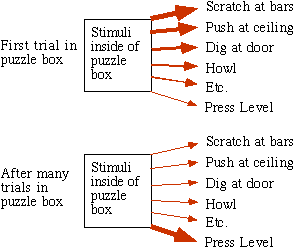Law of effect
Law of Effect
The Law of Effect is a psychological principle that was first formulated by Edward Thorndike in 1898. It is a fundamental concept in the field of behaviorism and plays a crucial role in the study of learning and behavior modification. The Law of Effect states that actions which produce satisfying consequences are more likely to be repeated in the future, whereas actions that lead to discomfort or unsatisfying outcomes are less likely to be repeated.
Background[edit | edit source]
Edward Thorndike, an American psychologist, conducted a series of experiments with animals, primarily cats, in puzzle boxes. Through these experiments, Thorndike observed that the cats would engage in a variety of behaviors to escape the box. Over time, the cats would learn to repeat specific actions that led to their escape and subsequent reward, thus demonstrating the basic principle of the Law of Effect.
Principles[edit | edit source]
The Law of Effect can be broken down into two main principles:
- Positive Consequences: Actions that are followed by a satisfying state of affairs are more likely to recur in the future.
- Negative Consequences: Actions that are followed by an unpleasant state of affairs are less likely to occur in the future.
These principles suggest that behavior is shaped by its consequences, and that learning occurs through a process of trial and error.
Application[edit | edit source]
The Law of Effect has wide-ranging applications in various fields, including education, psychology, behavioral therapy, and organizational behavior. It forms the basis for the development of more complex theories of learning, such as operant conditioning by B.F. Skinner, which further elaborates on how consequences influence behavior.
In educational settings, the Law of Effect supports the use of positive reinforcement to encourage desirable behaviors and learning outcomes. In behavioral therapy, it underpins techniques that modify behavior through reinforcement and punishment.
Criticism and Evolution[edit | edit source]
While the Law of Effect has been influential, it has also faced criticism and undergone modifications over the years. Critics argue that the law oversimplifies the learning process and does not account for cognitive processes involved in learning. Despite these criticisms, the Law of Effect remains a cornerstone in the study of behavior and learning.
See Also[edit | edit source]
This article is a psychology-related stub. You can help WikiMD by expanding it!
Search WikiMD
Ad.Tired of being Overweight? Try W8MD's physician weight loss program.
Semaglutide (Ozempic / Wegovy and Tirzepatide (Mounjaro / Zepbound) available.
Advertise on WikiMD
|
WikiMD's Wellness Encyclopedia |
| Let Food Be Thy Medicine Medicine Thy Food - Hippocrates |
Translate this page: - East Asian
中文,
日本,
한국어,
South Asian
हिन्दी,
தமிழ்,
తెలుగు,
Urdu,
ಕನ್ನಡ,
Southeast Asian
Indonesian,
Vietnamese,
Thai,
မြန်မာဘာသာ,
বাংলা
European
español,
Deutsch,
français,
Greek,
português do Brasil,
polski,
română,
русский,
Nederlands,
norsk,
svenska,
suomi,
Italian
Middle Eastern & African
عربى,
Turkish,
Persian,
Hebrew,
Afrikaans,
isiZulu,
Kiswahili,
Other
Bulgarian,
Hungarian,
Czech,
Swedish,
മലയാളം,
मराठी,
ਪੰਜਾਬੀ,
ગુજરાતી,
Portuguese,
Ukrainian
Medical Disclaimer: WikiMD is not a substitute for professional medical advice. The information on WikiMD is provided as an information resource only, may be incorrect, outdated or misleading, and is not to be used or relied on for any diagnostic or treatment purposes. Please consult your health care provider before making any healthcare decisions or for guidance about a specific medical condition. WikiMD expressly disclaims responsibility, and shall have no liability, for any damages, loss, injury, or liability whatsoever suffered as a result of your reliance on the information contained in this site. By visiting this site you agree to the foregoing terms and conditions, which may from time to time be changed or supplemented by WikiMD. If you do not agree to the foregoing terms and conditions, you should not enter or use this site. See full disclaimer.
Credits:Most images are courtesy of Wikimedia commons, and templates, categories Wikipedia, licensed under CC BY SA or similar.
Contributors: Prab R. Tumpati, MD


